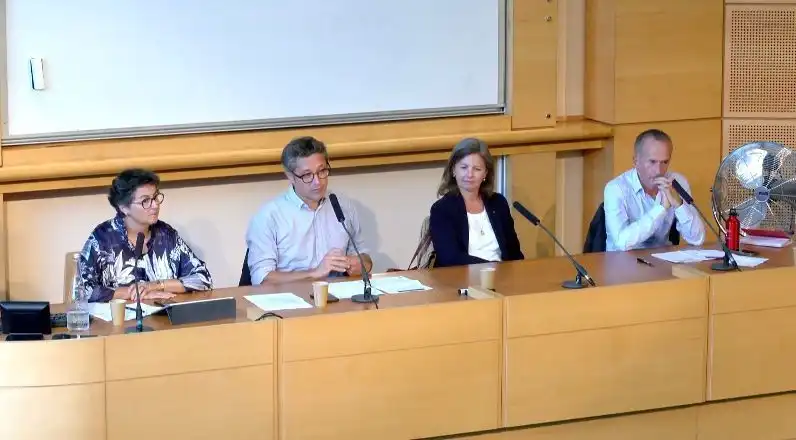Home>Discussion on the State of the European Union address: promoting democracy and solidarity
05.10.2022
Discussion on the State of the European Union address: promoting democracy and solidarity
Wednesday, 14 September, the President of the European Commission, Ursula von der Leyen, gave her yearly State of the European Union address (SOTEU) to the Parliament. On this occasion, she invited the First Lady of Ukraine, Olena Zelenska, and renewed the undivided support of the UE to Ukraine, among other strong announcements.
The Paris School of International Affairs (PSIA) and the School of Public Affairs of Sciences Po, along with the cooperation of the European Commission representation in France, organised an insightful event to discuss the SOTEU and its implications for France, Europe and the rest of the world. Valérie Drezet-Humez was present as Head of the European Commission Representation in France, replaced during the conference by her Deputy Jessica Larsson. As respectively Dean of PSIA and Dean of the School of Public Affairs, two Sciences Po’s schools particularly interested in European and international matters, Arancha González and Philippe Martin were the two other speakers of this conference.
Energy and solidarity: a “message of hope”
Valérie Drezet-Humez sees this iconic annual address, that exists since 2010, as a “political and democratic moment”. It isn’t the opportunity for Ursula von der Leyen to trace her steps on her past achievements but rather to express her view on the challenges at stake. More than one detail showed clearly that this time of war was a first in the history of the SOTEU, a time for the President of the European Commission to deliver a “message of hope”, of solidarity and courage. She needed to embody the European Union, as a carrier of solutions to ease the worries of its citizens.
Arancha González identified four main messages in the SOTEU, one was addressed to Russia. The Dean of PSIA, a school well versed in analysing international issues and power moves, saw a reaffirmation through the SOTEU of the European Union’s unconditional support of Ukraine, against Russia. Regarding Russia using energy as a weapon to attack the European Union, it seems to Arancha González that the President of the European Commission wanted to make known that they would “not sit idle” and that they would “achieve European energy”, thus cutting their “dependence to Russia, with solidarity”, and at the same time “accelerating decarbonisation”.
Indeed, if the means to achieve this goal are still pending, which is frustrating to Philippe Martin who does not understand why the embargo on Russian energy was announced six months in advance while the price caps are still not implemented, Valérie Drezet-Humez explains that the solution to seek is not only on the prices of energy but on the type of energy, on the “model we want to live in”.
The Dean of PSIA believes that another message, “the European Union locomotive will roar”, is also meant for strong players such as China and the United States, to express that the EU will give itself the tools to be competitive, such as flexibility on fiscal rules, trade agreements and investments on raw materials…
“Europe is serious about democracy”
If there is one element that the three speakers all agree on, it is the importance of democracy, as a core value of the European Union. Valérie Drezet-Humez states that the EU support towards Ukraine is not only military and humanitarian (for the refugees), it is a fight for European values such as democracy, freedom, media freedom… This fight that was the beginning of the European project is still very much valid today and she adds that young generations should never “take it for granted”. Philippe Martin salutes as well the strong power that European democracies represent against the Russian aggression, but he does warn about the relative weakness of democracy when the stakes are smaller.
Arancha González also identified in the SOTEU a message to the European citizens that “Europe is serious about democracy”. In order to have “credibility outside”, the EU needs to have “credibility at home”, and for the Dean of PSIA, this could come from measures such as fighting against corruption, speeding up the accession process (for North Macedonia and Albany in particular), following on the idea of a convention and building a political community of Europe. Sciences Po is doing its part by building alliances with other European universities through initiatives such as CIVICA.
The message that Ursula von der Leyen is addressing towards the rest of the world is for Arancha González that Europe takes its responsibility to care for “global public goods”, for human and labor rights, for concluding “the migration pact in a dignified manner” at heart. Such goals cannot be reached without cooperating with other continents such as Africa and South America.
The two deans of Sciences Po conclude their interventions on the fact that although the SOTEU was a most needed “strong message”, it should also leave some space for nuance and debate. Philippe Martin underlines the importance of being able to raise critics and discuss the sanctions against Russia, wishing they were more severe. Arancha González wars against dividing the world between good and bad actors and explained that a “space for dialog and cooperation” needs to be maintained with some autocraties, even if it “does not mean we need to like each other”.
MORE INFORMATION:
